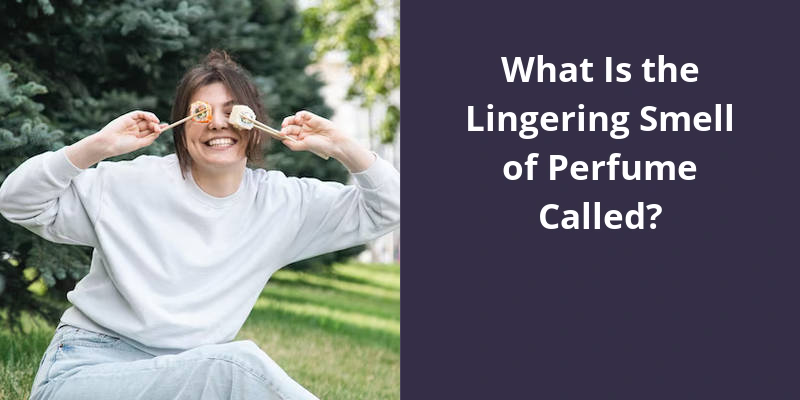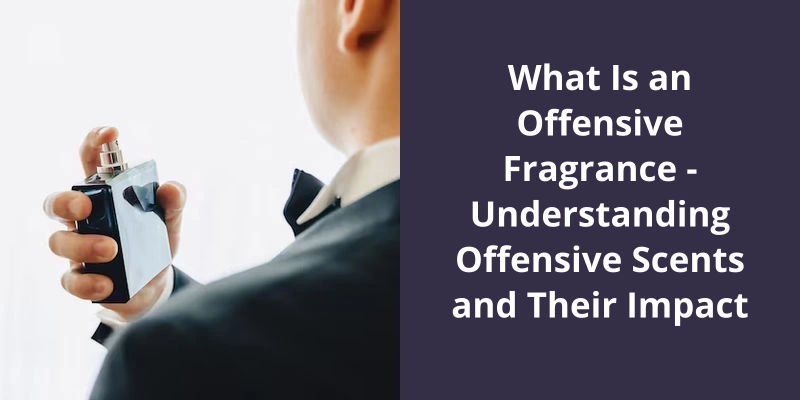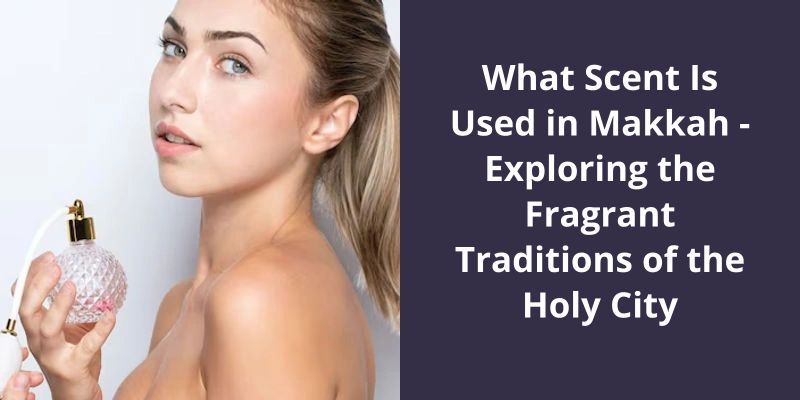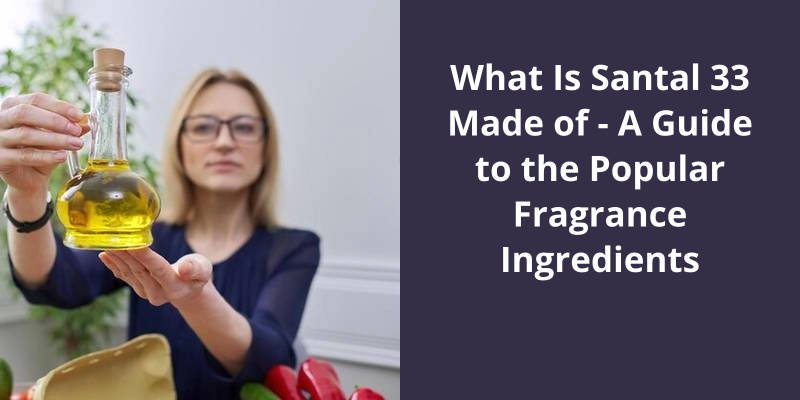Sillage, pronounced "see-yahzh", is the French word that beautifully encapsulates the lingering allure of perfume. This enchanting phenomenon holds a profound significance in the world of fragrances, as it signifies the power and intensity of a scent. The characteristics of sillage vary based on the weight and depth of the perfume. The heavier and more potent fragrances tend to possess a more pronounced and noticeable sillage, effortlessly captivating the attention of those who cross it’s path. On the other hand, lighter and ethereal scents tend to have a more delicate and subtle sillage, leaving behind a faint whisper of their essence that entices the senses. So, next time you catch a whiff of an exquisite fragrance lingering in the air, remember that it’s the irresistible sillage that continues to captivate and fascinate.

What Is a Perfume Smell Called?
What’s the lingering smell of perfume called? A fragrance is a complex composition of aromatic compounds that when applied to the skin or clothing, produces a distinctive scent. Commonly referred to as perfume, fragrances are carefully crafted with a balance of top, middle, and base notes to create a harmonious olfactory experience. The lingering smell that remains after the initial spray is commonly known as the perfumes sillage or trail. Sillage refers to the degree to which a fragrance projects and leaves a lasting aura in it’s wake. It captures the essence of the perfume, allowing the scent to leave an impression and be noticed even as the wearer moves through space.
The sillage of a perfume is determined by various factors, including the concentration of aromatic compounds, the quality of ingredients, and the overall composition. Higher concentrations, such as eau de parfum or parfum, tend to have a stronger and longer-lasting sillage compared to lighter formulations like eau de toilette or eau de cologne. The olfactory structure of the fragrance also plays a crucial role in it’s sillage. Notes that have more substantial molecular weight, such as woods, resins, or animalic ingredients, tend to have a more pronounced and lingering effect.
When it comes to perfume, the lingering scent is a result of various factors. People with oilier complexions tend to have perfumes cling to their skin for a longer duration. Additionally, the strength of the fragrance and the composition of it’s notes play a role. Fragrances with deep, smouldering base notes tend to evaporate more slowly, allowing the scent to linger in the air.
Why Does the Smell of Perfume Linger?
Additionally, the concentration of the perfume plays a significant role in how long it lingers. Perfumes with higher concentrations of fragrance oil, such as parfum or extrait de parfum, tend to have a longer-lasting scent compared to eau de parfum or eau de toilette. These higher concentrations allow the scent molecules to stick to the skin for a more extended period.
Moreover, the temperature and humidity of the environment can influence the longevity of perfume. Warmer temperatures and higher humidity levels can cause the scent molecules to evaporate more quickly, reducing the staying power of the perfume.
The natural oils and pH levels of the skin can affect the interaction between the fragrance and the body, either enhancing or reducing it’s longevity. Oily skin tends to retain scents better, while dry skin may struggle to hold the fragrance for an extended period.
Ultimately, the lingering smell of perfume is a result of various factors, including the individuals skin type, perfume concentration, ingredients, temperature, humidity, and body chemistry. By understanding these elements, one can select a fragrance that suits their preferences and provides a lasting scent experience.
A better word for scent could be fragrance, aroma, perfume, or redolence. On the other hand, stink or stench can be used as opposite words.
What Is a Better Word for Scent?
A better word for scent could be fragrance, aroma, or perfume. These words all emphasize the pleasant and distinctive nature of a smell. Other similar words include redolence, savor, odor, and bouquet.
On the opposite end of the spectrum, words like stink and stench convey a strong and unpleasant odor. These words are the antithesis of a pleasant scent.
When referring to a liquid worn on the skin, perfume is the most common term. However, other similar words include fragrance, toilet water, lavender water, cologne, parfum, eau de toilette, eau de cologne, and scoosh. These words all refer to fragrant liquids used for personal scent.
In a different context, the word scent can also refer to a trail indicated by the characteristic smell of an animal. In this case, similar words include spoor, trail, track, foil, and wind. These words evoke the idea of following an animals scent to track it’s whereabouts.
Lastly, the verb form of scent means to impart a pleasant scent to or to discern by the sense of smell. These words emphasize the act of perceiving or adding a pleasing scent. On the opposite end, smelly and malodorous are words that convey an unpleasant smell.
How to Choose the Right Fragrance for Different Occasions
Choosing the right fragrance for different occasions can make a significant difference in how you’re perceived and remembered by others. Here are a few tips to guide you:
1. Consider the occasion: Think about the event or setting where you’ll be wearing the fragrance. For formal events such as weddings or black-tie galas, opt for elegant and sophisticated scents. For casual outings or daytime activities, lighter and fresher fragrances may be more suitable.
2. Understand fragrance notes: Fragrances are typically composed of top, middle, and base notes. Top notes are the initial scents that you smell, while middle notes emerge after a few minutes, and base notes are the lingering scents that last the longest. Pay attention to the notes and choose a fragrance that aligns with the occasion.
3. Seasonal considerations: Different seasons call for different fragrances. In warmer months, go for lighter and citrusy scents to complement the sunny weather. In colder months, opt for richer and warmer fragrances with hints of spice or wood to create a cozy and comforting atmosphere.
4. Personal preference: Ultimately, choose a fragrance that resonates with your personal style and makes you feel confident. Experiment with different scents to find the one that suits your taste and evokes the desired mood for each occasion.
Remember, selecting the right fragrance is an art that requires careful consideration. By taking into account the occasion, notes, seasons, and personal preference, you can find the perfect scent to leave a lasting impression.
aromatic). The sense of smell plays a significant role in how we perceive the world around us, and certain scents have the power to evoke strong emotions and memories. Whether it’s the delightful aroma of freshly baked bread, the enticing smell of a blooming flower, or the captivating fragrance of a fine perfume, there are various ways to describe an excellent smell. Exploring the diverse synonyms of fragrant can enhance our vocabulary and allow us to more precisely convey the sensory experience of an exceptional scent.
What Is a Synonym for Excellent Smell?
Delectable)
The lingering smell of perfume, that captivating and elusive essence, has a captivating synonym: fragrant. Fragrant refers to a sweet, pleasing, and delightful aroma that awakens the senses and leaves a lasting impression. It’s an adjective that beautifully captures the essence of an excellent smell, captivating our olfactory receptors and transporting us to a world of sensory delight.
When something is fragrant, it exudes an aromatic quality that’s both inviting and alluring. The scent envelops the air, leaving a trail of deliciousness that tantalizes our senses. Whether it’s the delicate flowers in bloom, the warm spices of a delicious meal, or the alluring notes of a premium perfume, fragrance entices and enchants, setting the stage for a multisensory experience.
Each term conveys a specific nuance of a beautiful and excellent smell. Aromatic emphasizes the captivating and distinctive quality of a scent, while perfumed suggests the presence of a carefully crafted and alluring fragrance. On the other hand, the word savory conjures images of mouth-watering culinary delights that titillate our taste buds and our sense of smell simultaneously.
In addition to these, the term spicy can also be used as a synonym for an excellent smell. Spicy denotes a tantalizing scent that contains a combination of warm, invigorating notes that evoke feelings of excitement and exoticism. Whether it’s the aroma of a fragrant curry, a comforting blend of cinnamon and cloves, or the distinctive note of freshly ground pepper, a spicy scent adds an extra dimension to an already excellent smell.
These synonyms elegantly encapsulate the beauty and allure of a captivating scent. When we encounter a fragrance that enchants and lingers, we can use these synonyms to express the sheer delight and appreciation we feel toward such an olfactory masterpiece.
The Art of Creating Fragrances and the Role of Perfumers
- The art of creating fragrances
- The role of perfumers
- The process of developing a fragrance
- The importance of scent in our daily lives
- The history of perfumery
- The different fragrance families and notes
- The techniques used by perfumers
- The influence of culture and trends on fragrance creation
- The connection between emotions and scent
Perfume scents, known as scent families, encompass a wide range of olfactory experiences. These families, including Floral, Oriental, Woody, and Fresh, offer distinctive characteristics that allure individuals when selecting their preferred fragrances. From the delicate and romantic notes of florals to the rich and exotic aromas of orientals, each scent family holds it’s own allure and charm. So, let’s delve deeper into the fascinating world of perfume scents and explore the unique subfamilies within each category.
What Are Perfume Scents Called?
Perfume scents are referred to as scent families, which are further classified into four main categories: Floral, Oriental, Woody, and Fresh. Each scent family has it’s own unique characteristics and subfamilies that help in distinguishing various fragrances. People tend to have preferences for specific scent families when selecting personal fragrances.
The Oriental scent family exudes warmth, richness, and sensuality. It combines spicy, sweet, and exotic notes that create a captivating fragrance experience. The subfamilies in this category include oriental floral, spicy oriental, and soft oriental, among others.
The Woody scent family encompasses fragrances that provide a sense of depth and earthiness. With notes such as sandalwood, cedar, and patchouli, this scent family offers a blend of warmth and nature. Subfamilies like woody oriental, woody floral, and fresh woods cater to different preferences within the Woody category.
Lastly, the Fresh scent family captures the essence of cleanliness, crispness, and invigoration. It includes subfamilies like citrus, aquatic, and green, among others. Fresh scents are often associated with the outdoors, offering a rejuvenating and uplifting experience. Individuals seeking a refreshing and energetic fragrance often gravitate towards the Fresh scent family.
Whether it’s the delicate beauty of floral scents, the exotic allure of oriental fragrances, the earthy depths of woody aromas, or the invigorating freshness of the outdoors, the world of perfumes encompasses a diverse range of scents to suit every individual.
The Rise of Niche and Independent Perfume Brands
- Le Labo
- Byredo
- Escentric Molecules
- Frederic Malle
- Aesop
- Diptyque
- Jo Malone
- Maison Francis Kurkdjian
- Tom Ford Private Blend
- Le Labo
- Atelier Cologne
- Jo Loves
- Serge Lutens
- Etat Libre d’Orange
- Maison Margiela Replica
Conclusion
It embodies the essence of a fragrance's journey, akin to the captivating wake left by a majestic ship gliding through the water. This enchanting phenomenon takes flight as a perfume gracefully evaporates, delicately weaving a fragrant trail that lingers in it’s wake. The intensity of sillage varies, with richer and bolder scents leaving a more pronounced and noticeable olfactory imprint, while lighter fragrances bestow a subtle whisper upon the air. It’s within this concept of sillage that the magic of perfume truly unfolds, as every aromatic note dances within it’s ephemeral trail, leaving a lasting impression that transcends time and space.





